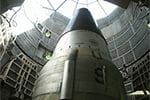Monitoring Nuclear Agreements with Iran and North Korea: Some Relevant Lessons from the Past
Wednesday, September 27, 2017 | 12:15-1:30 PM | SRH 3.122

Synopsis: Stopping the further development of nuclear weapons programs in Iran and North Korea are two of the most significant national security challenges facing the US. There is considerable debate within the US Government and with other nations about how best to proceed. Are there ways to strengthen the nuclear agreement with Iran, to understand better the state of Iranian nuclear weapons development, and to increase the confidence of all parties in the agreement? Are there negotiated solutions possible with North Korea that might lead to an effectively verifiable nuclear agreement?
This presentation will explore illustrative lessons of past efforts to block nuclear proliferation and to monitor arms control and nonproliferation agreements. What lessons can be drawn from those efforts that could be applied to the Iranian and North Korea cases. Specifically, we will examine ways that synergies can be pursued between national intelligence means and negotiated verification measures to help facilitate effective monitoring and confidence building measures. We will also examine the ways in which consultative bodies can be used within an agreement to build dialogue among the parties and to address points of contention over compliance and other issues. Here too the effectiveness of the tools would be enhanced by the close interaction of the intelligence and policy communities.
 Mr. Lauder is a leading authority on weapons of mass destruction, nonproliferation, arms control, homeland security, and intelligence analysis and collection. Mr. Lauder retired from the United States government in the fall of 2004 with over 33 years of managerial, analytical, and policy experience in the Central Intelligence Agency, National Reconnaissance Office, and as an arms control negotiator. He served subsequently for nine years as a senior manager and corporate officer within Areteꞌ Associates, a research and development company.
Mr. Lauder is a leading authority on weapons of mass destruction, nonproliferation, arms control, homeland security, and intelligence analysis and collection. Mr. Lauder retired from the United States government in the fall of 2004 with over 33 years of managerial, analytical, and policy experience in the Central Intelligence Agency, National Reconnaissance Office, and as an arms control negotiator. He served subsequently for nine years as a senior manager and corporate officer within Areteꞌ Associates, a research and development company.
Mr. Lauder continues to be instrumental in advising and shaping nonproliferation, research, strategic planning, and business development activities in the public and private sectors and chairs, or is an active member of, government, academic, industry, and laboratory advisory panels and task forces. He has helped lead broadly focused studies to improve intelligence on weapons of mass destruction, to address consequence management, to facilitate verification of international agreements, and to define initiatives for enhancing the counter-WMD and situational awareness capabilities of the United States and its allies. He has recently been a leader of efforts to improve monitoring of Iranian nuclear programs, to anticipate new WMD-related trends, to identify and disrupt middlemen and supply networks in illicit activities, and to facilitate data collection and sharing on international health challenges. He has also helped private companies in aligning their capabilities and products to meet vital international and national security needs and in expanding their outreach to the government sector.
Mr. Lauder has been awarded the Distinguished Career Intelligence Medal, the Distinguished Intelligence Medal, the NRO Gold Medal, and the Director of Central Intelligence’s Award for his leadership and innovation in collection systems, analytical approaches, and vital national security initiatives and decisions. He has a B.A. Summa Cum Laude from Hiram College and an M.A. in International Relations from Yale University.




